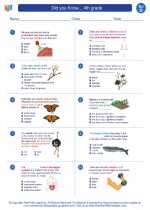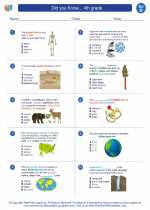Did you Know... 4th grade -> organ systems
Organ Systems
An organ system is a group of organs that work together to perform specific functions in the body. There are several organ systems in the human body, each with its own unique set of functions and structures.
Study Guide
- Respiratory System: This system is responsible for the exchange of gases, including oxygen and carbon dioxide, between the body and the environment. The main organs include the lungs, trachea, bronchi, and diaphragm.
- Circulatory System: This system is responsible for transporting blood, oxygen, nutrients, and hormones to and from cells throughout the body. The main organs include the heart, blood vessels, and blood.
- Digestive System: This system is responsible for breaking down food into nutrients that can be absorbed by the body and for eliminating waste. The main organs include the stomach, intestines, liver, and pancreas.
- Nervous System: This system is responsible for sending, receiving, and processing nerve impulses throughout the body. The main organs include the brain, spinal cord, and nerves.
- Excretory System: This system is responsible for removing waste and maintaining the body's water and electrolyte balance. The main organs include the kidneys, ureters, bladder, and urethra.
- Endocrine System: This system is responsible for producing and regulating hormones that control various bodily functions. The main organs include the pituitary gland, thyroid gland, and adrenal glands.
- Immune System: This system is responsible for protecting the body from disease and foreign invaders. The main organs include the thymus, spleen, and lymph nodes.
- Reproductive System: This system is responsible for producing and delivering sex cells and hormones for reproduction. The main organs include the ovaries, testes, uterus, and penis.
Understanding the functions and structures of these organ systems is crucial for comprehending how the human body works and how it maintains homeostasis.
For more in-depth study, consider exploring the individual organs within each system, their specific functions, and how they work together to support overall bodily functions.
Good luck with your studies!
[Organ Systems] Related Worksheets and Study Guides:
.◂Science Worksheets and Study Guides Fourth Grade. Did you Know... 4th grade
Study Guide Did you Know... 4th grade
Did you Know... 4th grade  Worksheet/Answer key
Worksheet/Answer key Did you Know... 4th grade
Did you Know... 4th grade  Worksheet/Answer key
Worksheet/Answer key Did you Know... 4th grade
Did you Know... 4th grade  Worksheet/Answer key
Worksheet/Answer key Did you Know... 4th grade
Did you Know... 4th grade 

 Worksheet/Answer key
Worksheet/Answer key
 Worksheet/Answer key
Worksheet/Answer key
 Worksheet/Answer key
Worksheet/Answer key

The resources above cover the following skills:
Core Ideas for Knowing Science
Life Science
Organisms are organized on a cellular basis and have a finite life span.